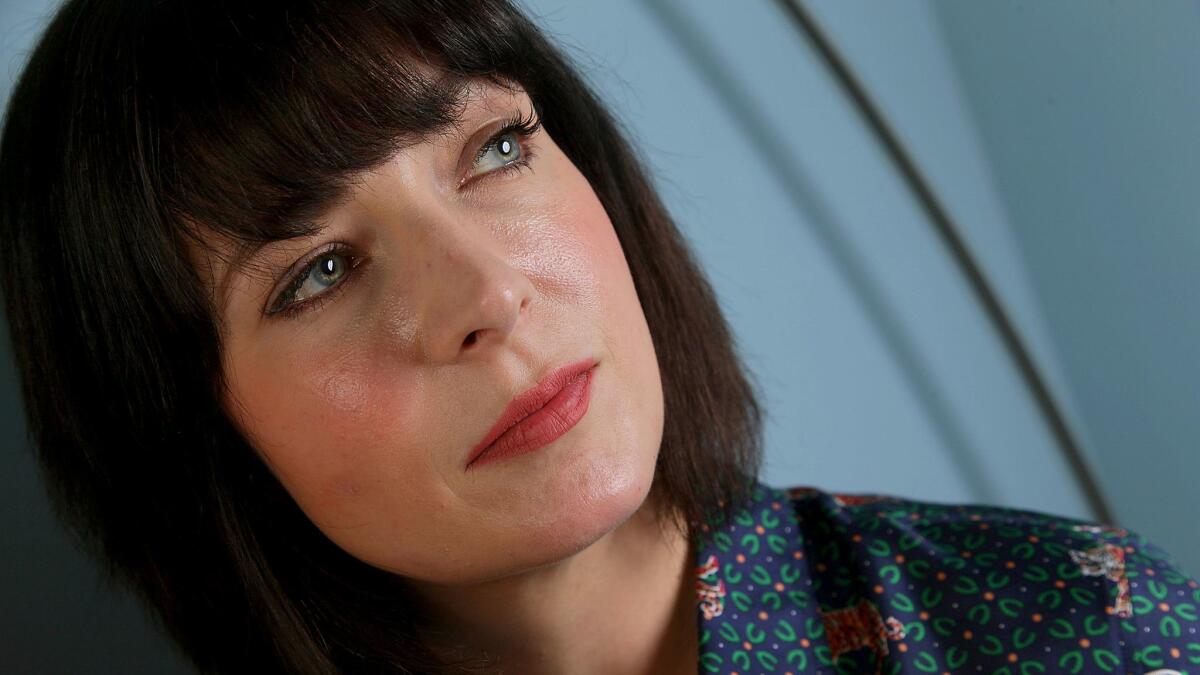In her own words, Diablo Cody reveals how writing ‘Tully’ saved her

In August of 2015, I gave birth to my third son. The pregnancy had progressed in the usual way: My body broadened into an A-frame house, my feet grew half a size, and the frontal lobe of my brain shut down. I became a primitive hindbrain in Birkenstocks, shuffling up and down the heat-warped streets of the Valley while my unborn child kicked my bladder like a bass drum.
Five weeks before my due date, I woke up in a pool of amniotic fluid. I was supposed to go to the “One Mississippi” writers room that day but, instead, I went to the hospital and met my son, Nico. He was so small that his diaper was the size of a deck of cards, but they discharged us quickly and I went home, intending to carry on as normal. I had done this twice before. I would be fine.
I wasn’t fine and, instead of committing myself, I wrote “Tully,” a screenplay about a new mom, Marlo Moreau, who is so exhausted she imagines (conjures?) a mysterious helper — the manifestation of her younger, unmarried self, Marlo Tully. A surprising number of people have asked me if I planned the “twist” from the beginning, to which I reply that the movie is the twist. It’s kind of like asking if “The Godfather” (weird comparison) was always going to be about the Mafia. The outward struggles of new moms have already been documented in films, TV shows and Tide commercials. It was the inner life of the new mother that I wanted to explore: the wild heart that still beats inside the docile cow.
RELATED: Charlize Theron bulks up, de-glamorizes and ‘deflates’ to revisit motherhood for ‘Tully’ »
Writing this script saved me. “Tully” became my Tully, my helper, a glowing, soothing presence I could return to whenever I felt overwhelmed. My laptop was speckled with dried breast milk because I’d pump and type at the same time. The manual for the breast pump referred to the action as “expression,” which seemed appropriate. I was expressing all over the place, left and right, literally and figuratively. The relief was tremendous.
When I look back on this process, I realize my concept for “Tully” could have been channeled into a much more commercial script: a goofball, bighearted Mother’s Day comedy about an exhausted mom and her wisecracking imaginary friend. This version would have had a different title: “Belly Laugh,” maybe, or “Mom’s Gone Crazy.” I could have gone that route and made way more money. Maybe I could even have parlayed it into a hilarious sequel.
But there’s no way I could have written a “popcorn movie” at the time. My commercial instincts — which are admittedly limited under even the best of circumstances — were nonexistent. I was a raw nerve, less a screenwriter in that moment than a mad diarist. I realize this all sounds totally pretentious and annoying, but if you’ve ever tapped a wound as an artist, you know what I mean. What comes out, comes out.
“Writing this script saved me.”
— Diablo Cody
Luckily for me, “Tully” became my third collaboration with my favorite director, Jason Reitman. I frequently pitch movie ideas to Jason with varying success, so I didn’t assume he’d be interested in this one, especially since we’d mined this concept (“babies complicate things”) in our two other projects, “Juno” and “Young Adult.” But Jason was excited. He pointed out, astutely, that “Tully” would be the logical final installment in our (unplanned) trilogy — “Juno” is about being prematurely thrust into adulthood, “Young Adult” is about resisting adulthood, and “Tully” is about finding grace and acceptance in midlife.
When Charlize Theron agreed to play the role of Marlo, I was shocked and thrilled; how many people get to see their postpartum angst embodied by a genius? I can’t imagine anyone else as Marlo.
Although they were revisiting some of the themes from “Young Adult,” I think Jason and Charlize plumbed new depths with this one. Jason created a hazy, painterly dream world of sunken wrecks and mermaids and imagined maternal terrors. Charlize transformed herself into a shell of a woman, staggering in the darkness until she ultimately pulls herself up and out.
It’s a tough movie for me to watch, and it was a tough one to write. But it was the best medicine I’ve ever had.
More to Read
From the Oscars to the Emmys.
Get the Envelope newsletter for exclusive awards season coverage, behind-the-scenes stories from the Envelope podcast and columnist Glenn Whipp’s must-read analysis.
You may occasionally receive promotional content from the Los Angeles Times.










